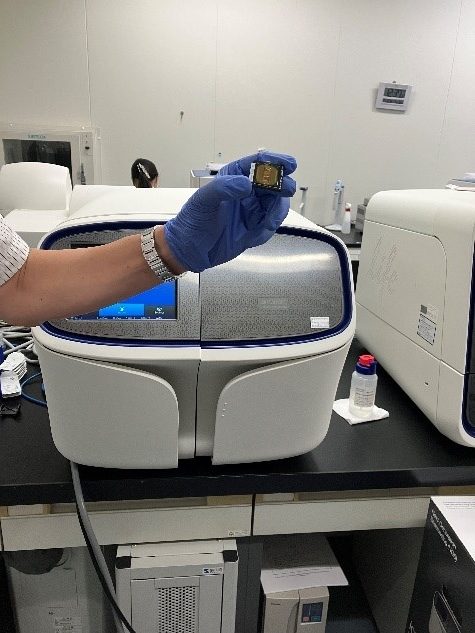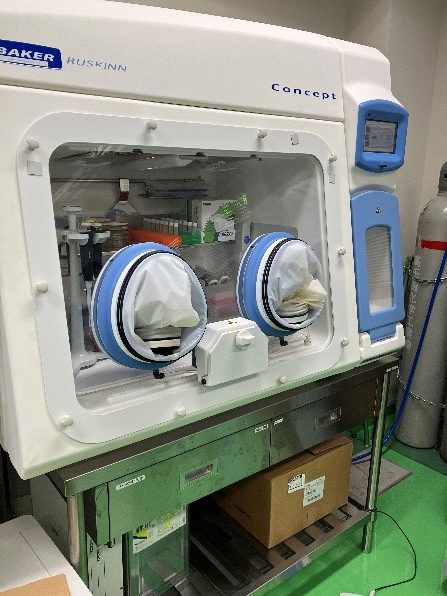Risk factor(Stress (immune, oxidation, lifestyle, glycation))
- HOME
- Healthcare(Complete Medical Checkup. Health Assessment)
- Risk factor(Stress (immune, oxidation, lifestyle, glycation))
- Ask a specialist in intestinal bacteria “Thinking about health from the intestine” Bacteria health checkup services and bacteria depository services provided by Sheep Medical Co.
Ask a specialist in intestinal bacteria “Thinking about health from the intestine” Bacteria health checkup services and bacteria depository services provided by Sheep Medical Co.
24.02.28
I was contacted by Sheep Medical to expand the use of next-generation sequencers to examine the DNA of intestinal bacteria for foreign customers coming to Japan. As I had the opportunity to visit the research laboratory of Sheep Medical, Inc., I spoke with Mr. Kazunori Shimada, a researcher and team manager of the Consumer Products Division.
EAJ: I already have a few things I’d like to ask you. What is the ” Bacteria health checkup “conducting intestinal DNA test?
Mr. Shimada: The human intestine is home to 40 trillion bacteria in about 1,000 species, which form the intestinal microflora or intestinal flora. Most intestinal bacteria, with the exception of E. coli and other bacteria, are “anaerobic” bacteria that die when exposed to oxygen. For the test, customers are asked to take a small amount of stool, about the size of a grain of rice, put it in a special stool collection kit containing liquid, and mail it to our laboratory. The liquid contains ingredients that kill bacteria immediately and protect their DNA, so the DNA of dead bacteria is fixed without breaking. Once the specimen arrives at the laboratory, a sequencer, a fast, high-volume DNA base sequencing device, is used to determine the type and percentage of bacteria in the person’s intestines. Japan is ahead of the rest of the world in this inspection area.

The test results, for example, in the case of this sample person, (unfolding the actual test result report) 71 types of bacteria were detected, but it looks like a code word and is unintelligible language to the average person, right?
EAJ: Yes, I cannot understand at all what does this code mean at when I see this.
Mr. Shimada: The report also includes a description of each bacterium, the age of the intestines calculated by a unique formula, and dietary advice based on the information from the medical interview to make it easier for the general public to understand.
EAJ: Oh, it says “degree of fatness” “fatty bacteria dominance”! I see that some averages are available. Once you get the results, will you offer your customer any support afterwards?
Mr. Shimada: In addition to dietary advice, we also suggest and sell supplements in line with the results if the diet alone is not sufficient. There are nine types of supplements, six of which are probiotics, which are bacteria themselves called as probiotics, such as Bifidobacterium bifidum and Bacillus natto, two are biogenics, which are substances produced by bacteria in the intestine to maintain normal human health, and the other is dietary fiber in supplement form.
EAJ: I have heard that ingesting the insufficient bacteria does not mean that they will settle in the intestines.
Mr. Shimada: Many bacteria are killed by stomach acid, but the carcasses also feed the bacteria, and fermented foods such as yogurt itself are biogenics, depending on your perspective. But the bacteria contained in commercial products are cultured from other people’s bacteria, and even if they are the same type of bacteria, they are not the same, so they may act to destroy the original bacteria. As we cannot always choose the right one, if you don’t get good results, it’s better to try again with something else. It is important to balance the bacteria existing now in a variety of ways. It also seems that when large amounts of bacteria are ingested at the supplement level, the bacteria in the intestines are surprised and fussed over, then activating the immune system and other systems. There is still much about bacteria that even researchers do not know.
EAJ: Are there anything other than food and supplements that are good for the intestine?
Mr. Shimada: Exercise and intestinal massage are also effective in stimulating intestinal motility. It is also important to get enough sleep because the intestines work better when the parasympathetic nervous system is active. With your effort, your intestine will change. It is often said that married couples look alike after living together for many years. Some people believe that it may be possible that our intestine bacteria will become similar because we are surrounded by similar bacteria. You can also use the bacteria health checkup services to check your condition when you are feeling well and know the balance of your good condition, or you can do it once because you are currently concerned about your intestines, and then do the test again to check the effectiveness of the supplements and other interventions. Make good use of it for your health.
EAJ: You mentioned that your company is ready to respond for people who is likely to suffer intestinal bacteria imbalances.
Mr. Shimada: Yes. Our company provides bacteria depository services. We isolate safe and useful bacteria such as bifidobacteria and lactobacilli from stools in good condition and freeze them. We believe it can be stored for up to 20 years since it will be placed in a freezer at minus 80 degrees Celsius. The idea is that if in the future the balance of bacteria in the intestinal tract is disrupted by cancer, anti-cancer treatment, or eradication of H. pylori, the balance of bacteria will be restored by thawing, culturing, drying, encapsulating, and ingesting deposited bacteria. I mentioned earlier that a culture of someone else’s bacteria can destroy the bacteria you have, but you don’t have to worry about that if you use your own bacteria. I actually took a culture of my own intestinal bacteria and my bowel movements become improved and felt comfortable from the first morning.

EAJ: It is very reassuring that your company is preparing for anything. Thank you very much for giving us a tour of your laboratory today.
Mr. Shimada talked about various intestinal bacteria one after another, and I was particularly impressed by his words, “With your effort, your intestines will change.” Why don’t you all undergo a bacteria health checkup as a start to keep your intestine healthy? As EAJ handles these services, please contact us for more information.
